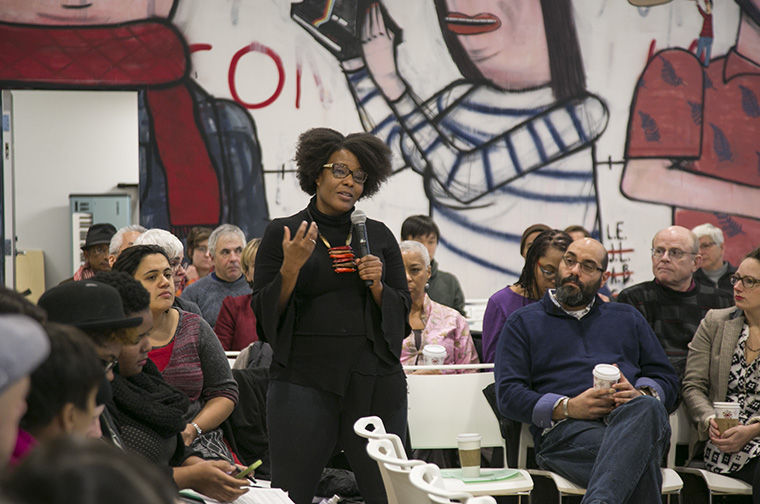Final roundtable wraps up feedback phase
Faculty, students and staff voiced opinions at the college’s final Strategic Planning roundtable on Dec. 1 in the 1104 S. Wabash Ave. Building. The session focused on issues pertaining to diversity, race and inclusiveness. Raquel Monroe, a professor in the Dance Department, was one of several faculty members to offer input at the event.
December 8, 2014
The college’s campaign to solicit feedback from the campus community as it drafts its Strategic Plan will conclude Dec. 8.
The college hosted six roundtable discussions throughout the semester as part of the initiative, each addressing a unique goal. The last of the sessions, held Dec. 1, addressed issues regarding diversity and inclusion on campus. The roundtable took place a few weeks after the college administration came under fire for a reduction in section offerings of “Gay and Lesbian Studies I.”
A subcommittee of the Strategic Planning Committee, which included Diana Vallera, an adjunct professor in the Photography Department; Onye Ozuzu, chair of the Dance Department; and Jeff Schiff, an associate chair in the English Department, led the discussion.
Comments from attendees included ideas of implementing a diversity class requirement within the college’s core curriculum that could educate students on issues of race, class and gender, a suggestion that Stan Wearden, senior vice president and provost, said resonated with him because it could help foster a more inclusive and open-minded campus community in coming years.
He said he was pleased with the event’s turnout because attendees fully represented the college community. He said he was especially pleased with the number of students who voiced their opinions because they gave meaningful feedback on a topic that is usually reserved for administrators, faculty and staff.
“There were several remarks about how [diversity] needs to reach out throughout our curriculum and be a part of the daily fabric of who we are,” Wearden said.
Raina Terry, a sophomore interdisciplinary major, president of the college’s Black Film Society and a One Tribe scholar, said she would like to see cultural competency training implemented for faculty and staff so they can better educate and interact with students. In addition to competency trainings, she said she would also like to see more equal race representation within the curriculum and also within the faculty.
Terry said many good points were brought up at the event but said she wished there had been a larger student turnout because it is important for the administration to hear student voices.
“It’s important for student voices to be heard at these forums because we’re the ones that are paying to be here,” Terry said. “It’s really important for us to be the ones to tell the administration what it is that we need from them and what we need them to do to make us feel safe.”
Terry said the college has tackled important issues throughout the semester in the roundtable sessions, and she is happy to see the administration being receptive to student feedback.
Victoria Shannon, an adjunct faculty member in the Humanities, History & Social Sciences Department, voiced her concern at the event about training faculty to embrace diversity, adding that it would be more effective to bring a curriculum advisor to the college.
“I think it’s the word ‘train’ that’s bothering me,” Shannon said. “It’s not a dog kennel where they’re going to train us to embrace inclusion and diversity. We need to talk to each other, which is hard to do in a culture of fear that we have been living in here at the college for the last few years. We’re all scared to death of losing our jobs or being escorted out of the building.”
Lance Cox, a junior cultural studies major, said at the event that he does not think faculty members try to understand their students’ individual backgrounds.
“There are youth here and everywhere in the city that are really doing valuable work and I find that it’s not valued at this institution,” Cox said. “What are we going to learn if we don’t feel respected in the classroom?”
Because the roundtable discussions have ended, Wearden said the next phase of the strategic planning process will take place during the college’s winter break, when the administration will gather feedback data from Civic Commons, the online database the college has been using to solicit feedback. He said it has become apparent throughout the semester that the college has a lot of work to do. The committee will draft an official plan outlining specific ways to achieve those goals, which will be given to President Kwang-Wu Kim in March. He added that once Kim revises it, a new draft will be released to the campus community for another feedback period.
Kim said he hopes the first draft of the plan proposes radical and aggressive ideas that will ultimately improve the college in several different areas. He said he anticipates seeing changes in the college’s department structure, curriculum and budgeting model, as well as changes in defining learning and student success outcomes.
“If the plan is really comfortable, safe and predictable, I’ll feel like, ‘Is that the best we could do?’” Kim said. “There are so many things like this that I hope the plan will really just grab a hold of. We have to be bold.”








